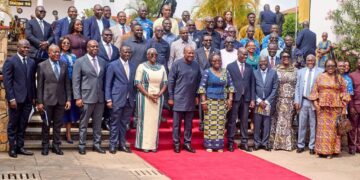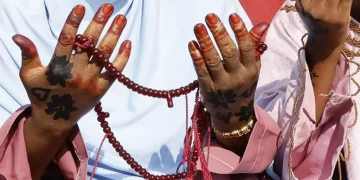Ghanaian TikToker Ebenezer Arthur, affectionately known online as Deaconess Abokomah, has mentioned that due to the nature of his comic acts, he’s received threats, but he’s learnt to focus on the positive side.
Rising fast to become one of the country’s most beloved social media comedians — a name synonymous with laughter, nostalgia, and the distinctive rhythm of Fanti humour.
Clad in her trademark GTP cloth, headscarf neatly tied, and voice laced with the sass of an old-fashioned Cape Coast woman, Deaconess Abokomah has built a loyal following across TikTok, Instagram, and YouTube.
His skits — witty, relatable, and peppered with local proverbs — capture the everyday wisdom, humour, and drama of Ghanaian life.
But behind the laughter and applause lies a journey of resilience and conviction.
While his videos have earned him national fame, they have also drawn criticism from some quarters — mostly over his cross-dressing, which forms the core of his comedic identity.

Speaking to Graphic Showbiz, Ebenezer revealed that his creative choices have sometimes made him a target of online trolls and moral critics.
“Some people just don’t understand what we do,” he said calmly. “The outfits fit the characters we portray. Once the cameras go off, we return to our real lives. It’s strictly for entertainment.”
He emphasized that his intention has never been to offend or challenge cultural values but to make people laugh and reflect. “People should understand that we are here to entertain. My videos are family-friendly and carry moral lessons. I want people to laugh, feel happy, and maybe even forget their worries for a while.”
However, the online hate hasn’t always stayed virtual, it has on few occasions remained frontal and physical.
Ebenezer recalls a disturbing encounter in Takoradi:
“A guy once warned me, saying, ‘Wait for the bill to pass in Parliament and you’ll see what I’ll do to you.’ I just ignored him and walked away.”
For him, these experiences are reminders of how misunderstood creativity can sometimes be. “Sometimes we get insults in the comments too, but I’ve learned to focus on the positive side,” he shared. “You can’t please everyone. So long as the majority are laughing and inspired, I’m happy.”

One of Deaconess Abokomah’s most recognizable trademarks is her distinctive patterned cloth — a symbol that has become part of her comedic identity.
“My mom gave me different clothes to wear, but anytime I tried to change, fans asked me to go back to the old ones,” he laughed. “They’re all GTP fabrics, and that brand reminds people of our mothers and aunties. So, I kept it as my identity.”
That simple choice — to stay authentic — has paid off. For many fans, Deaconess Abokomah isn’t just a funny character; she represents a nostalgic connection to home, tradition, and the older women who shaped Ghanaian families.
What began as short comedy videos has now become a full-fledged career. Ebenezer says TikTok has been his main source of income, but his growing popularity has opened new doors.
“TikTok opened many opportunities,” he shared proudly. “I’ve hosted events like the Diamond Divas White Party in London and done advertisements in Dubai. I also take up emceeing, karaoke gigs, and promotional deals when they come.”

Despite financial challenges slowing down some of his business plans, Ebenezer remains optimistic. “The goal is to keep pushing. I believe that with consistency, more doors will open. This is just the beginning.”
In a digital world where shock content often dominates, Deaconess Abokomah’s brand stands out for its simplicity and moral grounding.
“My videos are clean,” he said. “You can watch them with your children or parents. That’s what makes me different. I don’t believe comedy should be dirty to be funny.”
His content, often infused with Fanti expressions and traditional values, reflects his mission — to entertain while preserving culture.
For Ebenezer Arthur, laughter is both a calling and a form of cultural preservation. Beneath the wigs and vintage cloth is a storyteller reminding Ghanaians to find joy, even in hardship.
As he puts it, “If someone can watch my video and forget their stress for a few minutes, then I’ve done my job.”
He is known for his humorous and entertaining content, particularly skits and videos on social media platforms like TikTok, Instagram, and YouTube. His content often features a “wahala” (trouble) theme. He was born in Takoradi, where he grew up and schooled, and is a singer who performed at bars and pubs in his younger years.

























